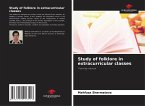Our brain is the most complex living structure in the universe. Neuroscientists are faced with the daunting task of unlocking the secrets of hundreds of billions of interconnected nerve cells. The motivation of researchers is twofold. On the one hand, they want to find ways to prevent neurological diseases of the brain. On the other hand, they want to better interpret and understand the brain as a gigantic 'hard drive' - a highly complex control centre made up of billions of nerve cells. It stores our entire life, thousands of people and objects, and links memories to them. The greatest and most mysterious puzzle in science remains how this masterpiece works at the level of neural networks. Can the achievements that medicine has already made in the prevention, early detection and treatment of neurological diseases such as Alzheimer's, Parkinson's, multiple sclerosis and stroke also be transferred to educational practice?
Bitte wählen Sie Ihr Anliegen aus.
Rechnungen
Retourenschein anfordern
Bestellstatus
Storno








